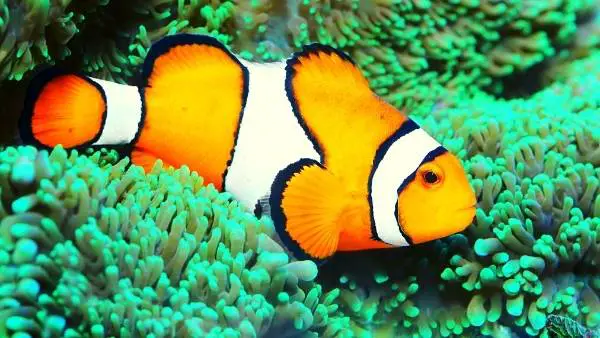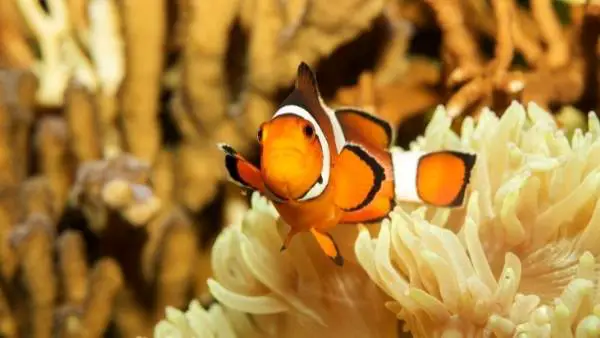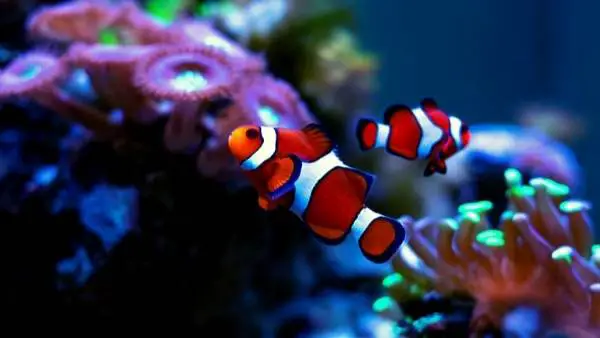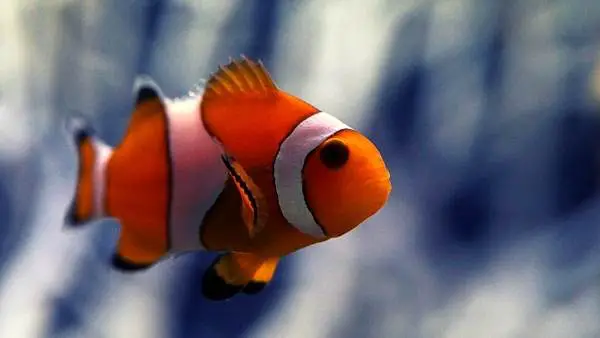Clownfish are certainly one of the most popular tropical saltwater fish in the hobby, and there are many good reasons for this. There are so many different types of clownfish that range in size, coloration, and patterns. Another significant reason is their relaxed nature and peaceful personalities, which is why so many people try to produce more clownfish by breeding them. However, the process is not as simple as it seems.

Additionally, your clownfish can easily fall pregnant without any intention of them doing so. If this is the case, then it is equally important to be able to tell whether your clownfish is pregnant or not as it would be if you were trying to get them to breed.
How Do Clownfish Get Pregnant?
Well, clownfish don't actually get pregnant in the sense that most people would think, the females produce eggs which are then fertilized by the males. It is fairly straightforward to tell whether or not your clown is pregnant/carrying eggs due to an increase in size and aggressiveness, naturally becoming more protective. Once the eggs have been laid, it will take between 5 and 10 days for them to hatch into larvae, and the baby clownfish to appear!
Clownfish Breeding Behavior Guide
Although it sounds pretty straightforward when trying to tell whether or not your clownfish is pregnant, it can be difficult to gauge due to similar symptoms that can be attributed to illness and disease for your fish. This guide will provide you with all the best insight that your clownfish is indeed pregnant and close to laying their eggs.
Funnily enough, despite producing eggs that are then fertilized by males, clownfish are not livebearers. Also, they are classified as hermaphrodites, which means that they contain both male and female sex organs and have the capabilities of growing into either a male or a female during their life.
The way this works is if you were to introduce three clownfish to the same tank, two of them would develop sex organs. One of these would be male and the other female, and if the male or female cannot breed or die for some reason, then the other clownfish will mature into either a male or female, whichever sex is needed for the fertilization process to begin.
How Do You Tell If Your Clownfish Is Pregnant?
Clownfish will typically display some tell-tale signs when they are ready to lay their eggs, which you should closely follow to smooth out the process. Moreover, they will display some pretty clear indications that they are carrying eggs too, not just when they are about to lay them. Let's dive into all of these tell-tale signs to make your clownfish breeding experience as seamless as possible.

Large Belly
Clownfish will typically adopt a large belly when their eggs are being produced, this is due to the egg-producing organ in their bodies expanding. The overall size of your pregnant clownfish will be bigger than usual too, head, tail, fins, etc.
Seeing a significant increase in size to one of your clownfish will usually mean that they are pregnant, however, you cannot just assume pregnancy from this one indication, there are many other signs you must look for in addition to this one.
Aggressive/Territorial Behavior
Clownfish are very peaceful fish in general, which is why there are so many beautiful and compatible clownfish tank mates out there. However, if your clownfish is carrying eggs, they will likely become more aggressive and irritable, not allowing any other fish or organisms to come anywhere near her. This is because they are incredibly protective over their eggs and must ensure a safe place for them to be fertilized.

If you come across this behavior in your tank, the best thing to do is remove the other fish that are disturbing your clown temporarily. By doing this you will relieve the stress of your pregnant clownfish and also your other fish. Whatever you do, do not remove the mother clownfish from your tank, this can and most likely will massively hamper the clownfish breeding process.
Inactive Clownfish
Usually, a pregnant clownfish will establish a small area of your tank where they will consistently linger before laying their eggs, this leads to them being significantly more inactive. If your clownfish is carrying eggs, they will not be seen swimming around happily, they will be more stationary, encompassing one small area.
General laziness and inactivity can be caused by other reasons too, so, do not just assume that your clownfish is pregnant if they do not move very much, this could be caused by something else which is usually a health-related issue.
Protrusion
If you notice something large protruding from the body of your male or female clownfish, do not panic! This is very normal to see in pregnant clowns and is an indication that the sex organs are preparing for the fertilization process.
Nesting
When your clownfish is ready to start producing eggs, it will find a quiet, peaceful, and safe place in your tank to do so. Fish typically share the same breeding habits and attitudes. Clownfish prefer smooth and hard surfaces when laying their eggs, and the male will always stay with the female, protecting her whilst she lays her eggs.

If your clownfish begins to lay eggs thanks to your support, the key is to leave them to it. Do not disturb your clownfish during this process and try your best to alleviate any possible disturbances by the other members of your aquarium community!
How do I Take Care of my Pregnant Clownfish and Smooth the Process?
There are many good options you can take when you want to ensure a smooth process for your Clownfish's pregnancy - here is a 4-step process you can follow:
- One of the best and possibly most simple is to provide them with a strong diet, rich in protein. Live food such as blood worms are perfect for this, but make sure you do not overfeed your fish. It is straightforward, and on every clownfish care guide, however, you'd be surprised!
- Cleaning your clownfish tank regularly will ensure much healthier fish and therefore will make them more likely to breed. Check the level of toxins in your tank and remove the necessary amount on a regular basis.
- When it is time for your clownfish to start producing eggs, it is a good idea to remove other fish from your tank. Having more open spaces and no immediate danger to your fish or eggs will ensure steady and healthy fertilization.
- When your clownfish is about to produce eggs, do not bother or disturb them, removing invertebrates and other organisms is good for this too. The more agitated and aggressive your pregnant clownfish is, the higher the likelihood of something going wrong.
Clownfish typically produce eggs once they reach maturity, however, it is fertilizing these eggs which is the hard part. The eggs will usually not fertilize properly into healthy larvae, however, by following this guide you will certainly increase the possibility of seeing some healthy baby clownfish appear in your tank, so good luck!

